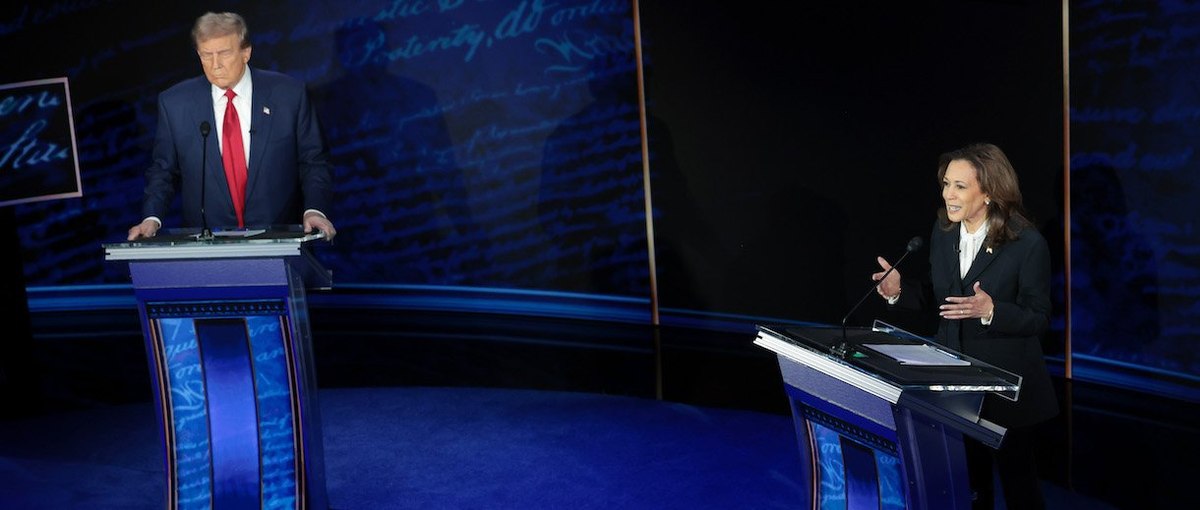A YouGov poll of 1,407 U.S. adults between September 10 - 11, 2024 — conducted for the Times and SAY24, a joint project of Stanford, Arizona State, and Yale Universities — shows how Americans perceive the first presidential debate between Kamala Harris and Donald Trump, and how opinions of the two candidates changed after the widely watched event. Participants were interviewed before the debate and again afterwards.
Harris was the clear winner of the debate but her narrow lead over Trump in the election was the same after the debate as before it. Other indicators for Harris improved, a possible precursor for later gains from her debate win. Many Americans — and particularly Trump supporters — believe false claims he made in the debate. And Americans say they would be open to supporting a qualified woman running for president, but many have doubts about other voters' willingness to do so.
Who watched
48% of Americans say they watched the debate live and 6% delayed. An additional 13% say they had seen debate highlights by the time we interviewed them (either on Tuesday night or during the day on Wednesday).
68% of Americans 45 and older say they watched the debate in some form — live, delayed, or in highlights — compared to 56% of younger adults.
Who won
55% of debate watchers say they thought Harris won the debate, while only 25% thought Trump won. Before the debate, it was a virtual tie: 40% thought Harris was more likely to win, while 38% said Trump was.
Trump’s performance was widely criticized, even by his supporters. 59% of debate watchers say Harris was “better prepared,” including 23% of people intending to vote for Trump. 72% say that he lied about at least “a few things,” including nearly half of his supporters. By 49% to 29%, debate watchers say Harris was “easier to understand.”
48% of debate watchers say they learned some or a lot about Harris; only 32% say the same about Trump. 52% say they learned nothing about Trump, compared to 31% who say the same about Harris.
Overall, 50% think that the moderators were fair to both candidates, 35% think they were fair to Harris and unfair to Trump, 6% unfair to Harris and fair to Trump, and the remainder unsure or unfair to both. 73% of Trump voters think the moderators were unfair to him.
Impact on voting intentions
The debate, at least so far, did not change the relative standing of Harris and Trump in the election. Before the debate, Harris led Trump by 1 point, 46% to 45% with 6% undecided. After the debate, there was no change in these numbers, with Harris still leading by a single point nationally.
This doesn’t mean that there won’t be a larger impact as time passes. In the presidential debate between Joe Biden and Trump on June 27, there was only a 1-point change in voting intention in the first 24 hours following the debate, but Biden’s support shrunk more in the following days and weeks. But 24 hours after the end of the debate, voting intention has not moved.
Impact on candidate evaluations
While the debate did not appear to change voting intentions, there is some evidence of other movement in Harris’ direction, based on interviews with people before and just after the debate, though the changes generally are within the margin of error.
The percentage willing to consider voting for Harris did increase by a bit less than 1 percentage point while the percentage willing to consider voting for Trump remained unchanged. Harris has a higher ceiling than Trump, with some room to gain support.
There was a 5-point drop in the percentage thinking Harris is not qualified to be president and a 3-point increase in the percentage thinking she is qualified.
After the debate, the share who like Harris “a lot” or “somewhat” rose 2 points.
The share of Americans who think that Harris “says what she believes” rose 4 points, while the share who think that she “says what she thinks people want to hear” rose 1 point. The share who are not sure fell by 5 points as people firmed up their impressions of her.
Belief in Trump claims
While far short of majorities, significant shares of Americans accept several false claims made by Trump. 32% say it is true that the 2020 election was stolen from Trump. 33% believe that "Trump recommended that 10,000 national guard troops be sent to the Capitol on January 6, 2021, but Nancy Pelosi turned this suggestion down." 21% believe that "in certain states, it is legal for a doctor to perform an abortion after birth." And 20% believe "immigrants are abducting and eating dogs and cats in Springfield, Ohio."
These assertions divide Trump supporters and that division varies from claim to claim. 75% of Trump supporters believe that Pelosi turned down Trump's request for National Guard troops on January 6, 9% do not, and 16% are unsure. 67% of Trump supporters believe the 2020 election was stolen from him, 12% do not, and 22% are unsure. Just 36% of Trump supporters believe doctors can perform abortions after birth in certain states, 26% do not, and 38% are unsure. And just 43% of Trump supporters believe immigrants are abducting and eating dogs and cats in Ohio, while 16% do not, and 40% are unsure.
Gender and the election
Questions about gender politics show considerable correlation to current vote choice. It is likely that thoughts of Harris and Trump are weighing heavily when we ask respondents to think about “a man and a woman running for president.”
More than one-third of Americans are willing to express a preference when offered a choice "between a man and a woman running for president who are equally qualified," but these choices vary greatly by party: Democrats prefer the woman to the man by 43% to 3%, while Republicans prefer the man to the woman by 30% to 1%. Independents are split: 12% say they would be more likely to vote for the man while 10% say they would be more likely to vote for the woman.
Only 37% of registered voters say all or most Americans would be willing to vote for a woman over a man for president if both are equally qualified, while 28% say about half would support the woman, and 19% say some or none would. The party differences on this question are less stark: 42% of Democrats who are registered voters say all or most Americans would be willing to support an equally qualified woman over a man, compared to 32% of Republicans.
Americans polarize sharply on party lines about whether it would be a good or bad thing for the U.S. to elect a woman as president. 84% of Democrats say it would be a good thing and 1% say it would be a bad thing. Only 10% of Republicans say it would be a good thing while 27% say it would be a bad thing.
More registered voters say Democrats talk about topics such as race and gender too much than say the same about Republicans (48% vs. 35%). Party differences explain the gap: 80% of Republicans who are registered voters say Democrats talk too much about race and gender, compared to just 60% of Democrats who say the same about Republicans.
Related: Kamala Harris leads in four of seven swing states in the latest Times/SAY24 polling | YouGov
See the results for this YouGov poll
Methodology: This poll was conducted online on September 10 - 11, 2024, after the first presidential debate, among 1,407 U.S. adults who had also been interviewed before the debate. The pre-debate sample was weighted according to gender, age, race, and education, as well as 2020 Presidential vote and 2022 baseline partisan identification. The post-debate sample was weighted to account for differential non-response using gender, age, race, education, geographic region, pre-debate partisan identification, and pre-debate presidential vote intention. Demographic weighting targets come from the U.S. Census American Community Survey and the U.S. Census Current Population Survey. The margin of error for the overall sample is approximately 5%.
Image: Getty
What do you think about the election, American politics in general, and everything else? Have your say, join the YouGov panel, and get paid to share your thoughts. Sign up here.












